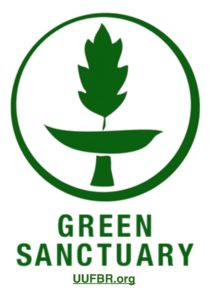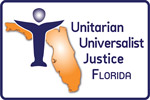About
This website is maintained by the UU Justice Florida Climate Resilience Network, and is designed to provide tools for residents and organizers in coastal areas who are educating residents about the health effects of climate change. Videos and information sheets can be used by organizers to self-educate, and project documents can be down-loaded and edited to include relevant local information in outreach efforts. Organizer notes and tips from lessons learned in two pilot communities in Palm Beach County, Florida are also included.
The increasing concentration of greenhouse gases, resulting warmer temperatures, and the related impacts of sea level rise, extreme rain, storm events, and possible droughts will all have both direct and indirect impacts on human health. Vulnerability varies by region and community demographics; optimal resiliency requires a vibrant public health education initiative that provides information and resources that allow residents to respond appropriately.
The Resilience Adaptation Community Tool Kit (ReACT) and website, developed by the Green Sanctuary Committee of the Unitarian Universalist Fellowship of Boca Raton (UUFBR), was created to raise awareness of the diverse health impacts of climate change and increase climate resilience in vulnerable communities. Initial development was funded by the Environmental Protection Agency (EPA). Subsequent funding for expanding the work statewide in Florida has been provided by the Unitarian Universalist Fund for Social Responsibility, Unitarian Universalist Fellowship of Boca Raton, and funds raised by Unitarian Universalist Justice Florida. ReACT is a replicable education outreach initiative designed to help communities better understand the linkages between health and climate and the adaptive actions that can be taken to reduce negative impacts.
Because the EPA has specific enabling legislation regarding clean water issues [Clean Water Act, Section 104(b)(3)] and Toxic Substances [Toxic Substance Control Act, Section IO9A)], ReACT is focused on health issues related to water management. These include: flooding from rainstorms, storm surge and sea-level rise, contamination of the water supply and adjacent water sources; and the secondary related impacts of indoor mold, algae blooms and vector borne diseases.
The pilot project involved two South Florida communities: South Delray Beach and the historic Pearl City neighborhood in Boca Raton that includes the adjacent communities of Lincoln Court and Dixie Manor. Subsequent projects have been completed in West Palm Beach, Hernando County, Sarasota, Ft. Myers, and Naples. Ongoing work is in Shorecrest. Miami.
Background
In 2010, South Florida’s four southeastern counties created the Southeast Florida Regional Climate Change Compact (the Compact), an organization tasked with developing a regional approach for mitigating and adapting to climate change. Through a participatory planning process, the Compact developed a comprehensive report: the Regional Climate Action Plan (RCAP) with 110 policy recommendations for adaptation and mitigation. In 2013, noting that there were few references to health effects, the Compact commissioned the Florida Public Health Institute, now the Florida Institute for Health Innovation, to conduct a more complete health impact assessment and identify strategies to minimize the health effects of climate change on the region’s population.
Published in 2014, the completed Health Impact Assessment (HIA), recognized that knowledge must be acquired at the local, community and individual level. Among the final recommendations, the HIA suggested producing informational materials and social media resources for community outreach purposes (HIA, p. 105). This recommendation is also supported by the academic community in its emphasis that messaging about the health impacts of climate change makes the climate issue more germane to individuals than framing the issue of climate change as an environmental problem. (Maibach et al., 2010).
As an organization, UUFBR began studying environmental justice as part of the Green Sanctuary accreditation process. The Our Place in the Web of Life curriculum broadened the Unitarian Universalist commitment to engage in social action and environmental justice. The need for regional education documented in the RCAP and HIA, combined with the EPA’s specific Environmental Justice Small Grant offering were the impetus for the involvement of UUFBR in climate-related education and outreach to local vulnerable communities. The Green Sanctuary’s grant application included specific activities to develop climate communicators within the community and make them known to the community through neighborhood canvass, community meetings, and surveys designed to assess the community’s current climate health impacts and the residents’ perception of sea level rise risk. Thus, neighborhood education, leadership development and empowerment, and increased climate resilience were all stated goals of the initiative.
The health impacts of climate change are also the focus of the Centers for Disease Control and Prevention’s Building Resilience against Climate Effects (BRACE) Initiative. The BRACE initiative uses an adaptive management framework to address climate change adaption. Within this framework, Step 4 requires “developing and implementing a Climate and Health Adaptation Plan.” The UUFBR ReACT project specifically addresses the public education component by identifying key stakeholders and communication strategies needed to increase resiliency.
Contributing Authors:
Dr. Ana Puszkin-Chevlin
Janice T. Booher, M.S.
Editors:
Debora Kerr, MA
Debra Weiss-Randall, EdD, CHES


